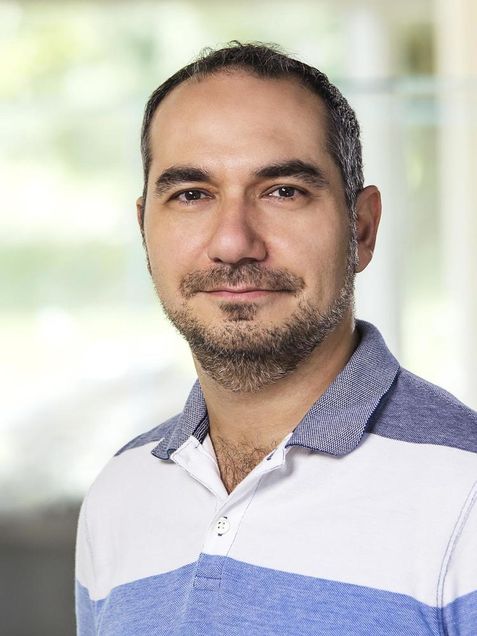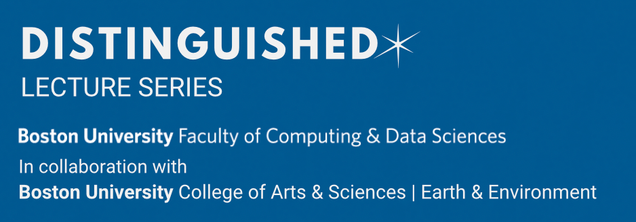Distinguished Lecture Series: Elie Bou-Zeid
Intersecting Data and Urban Sciences to Create Livable Future Cities
Monday, June 26 | 11:00am | CDS 1750 (in-person only)
As part of its Distinguished Lecture Series for 2023, and in partnership with the Earth & Environment Department in the College of Arts and Sciences, the Faculty of Computing & Data Sciences is hosting Professor Elie Bou-Zeid who will be delivering a lecture entitled "Intersecting Data and Urban Sciences to Create Livable Future Cities."
 Elie Bou-Zeid is Professor of Civil and Environmental Engineering at Princeton University, where he also served as the founding director of the Metropolis Project for urban technology until 2022. He is associated faculty in the Center for Information Technology and Policy, the High Meadows Environmental Institute, and the Andlinger Center for Energy and the Environment at Princeton. Bou-Zeid's research is broadly focused on fusing novel observations and physical and data-driven modeling of mass and energy transfers in the lower atmosphere, with applications to urban environmental quality, building energy efficiency, and renewable energy production.
Elie Bou-Zeid is Professor of Civil and Environmental Engineering at Princeton University, where he also served as the founding director of the Metropolis Project for urban technology until 2022. He is associated faculty in the Center for Information Technology and Policy, the High Meadows Environmental Institute, and the Andlinger Center for Energy and the Environment at Princeton. Bou-Zeid's research is broadly focused on fusing novel observations and physical and data-driven modeling of mass and energy transfers in the lower atmosphere, with applications to urban environmental quality, building energy efficiency, and renewable energy production.
Dr. Bou-Zeid is editor of the Journal of the Atmospheric Sciences and chair of the Boundary-Layers and Turbulence Committee of the American Meteorological Society. Previously, he served on the New York City Urban Heat Island Working Group. Bou-Zeid holds a Bachelor of Mechanical Engineering and a Master of Environmental Engineering and Water Resources from the American University of Beirut, and a Ph.D. in Environmental Engineering from the Johns Hopkins University. Learn more about Dr. Bou-Zeid here.
Abstract: Cities and urban systems are emerging as the central arenas for the nexus of multiple grand challenges facing humanity. Future metropoles will house around 70% of the world’s population in 2050, and consume well over 70% of its energy. Simultaneously, cities will bear the brunt of the confluence of climate and weather extremes, rapid technological shifts, and demographic change, along with the political, and socio-economic challenges they will bring about. Traditional research tools that would be used to address such a range of hazards are ill-suited for cities, challenged by extreme spatial and temporal variability and myriad interacting natural and anthropogenic processes. Advancing urban science, planning, and management is thus triggering the development of new paradigms in computational modeling and urban sensing. For example, cities today host well over 10 billion Internet of Things devices collecting physical observational data and around 4 billion citizens generating anthropogenic data that can provide invaluable information for urban research. These datasets also include street views and maps that can be translated into highly detailed inputs to model the interaction of urban and natural systems in built terrain, and
ultimately develop urban digital twins.
 This talk will overview the application of such novel approaches to two main drivers of adverse environmental quality in cities: air pollution and extreme heat. Using data from fixed and mobile low-cost sensor networks, we apply classical machine learning approaches to distinguish between the meteorological and urban drivers of air pollution and predict their concentrations at unsensed locations and future times. Early results will then be presented from ongoing efforts to apply deep learning to predict environmental conditions based exclusively on analysis of urban images (at street level and from satellites). Finally, we discuss developments in physical and data driven modeling aimed at climate-proofing future cities, enhancing their livability, and protecting citizens from extreme heat using novel materials and emerging opportunities at the intersection of urban mobility and big data.
This talk will overview the application of such novel approaches to two main drivers of adverse environmental quality in cities: air pollution and extreme heat. Using data from fixed and mobile low-cost sensor networks, we apply classical machine learning approaches to distinguish between the meteorological and urban drivers of air pollution and predict their concentrations at unsensed locations and future times. Early results will then be presented from ongoing efforts to apply deep learning to predict environmental conditions based exclusively on analysis of urban images (at street level and from satellites). Finally, we discuss developments in physical and data driven modeling aimed at climate-proofing future cities, enhancing their livability, and protecting citizens from extreme heat using novel materials and emerging opportunities at the intersection of urban mobility and big data.
